The Philippines is made up of 7,641 islands. They are no stranger to climate change and humanitarian crises. Yet, in the face of it, women are coming together to demand their rights. They are stepping up, and they are making sure their voices are heard, loud and clear.
How are they demanding action?
On the 12th – 13th April, ActionAid, with support from the Australian Government through the Australian NGO Cooperation Program (ANCP), supported the Women in Emergencies Network (WENet) in the Philippines to hold its first ever Womenitarian Summit. The Summit focused on three key areas: upholding women’s rights, elevating their leadership, and promoting women’s resilience in disasters and crises.
Over 150 women from all over the Philippines came together to bring attention to the needs of women, and highlight the fundamental role they play in rebuilding communities in the aftermath of a disaster. There were farmers, fishers, indigenous women, women with disabilities, members of the LGBTQ community – to name a few.
Together, they drafted a declaration to hand to NGOs and government representatives that shed light on what they believe is important. It addressed climate action, the need to respect the environment, gender-based violence and inclusive approaches to humanitarian response.
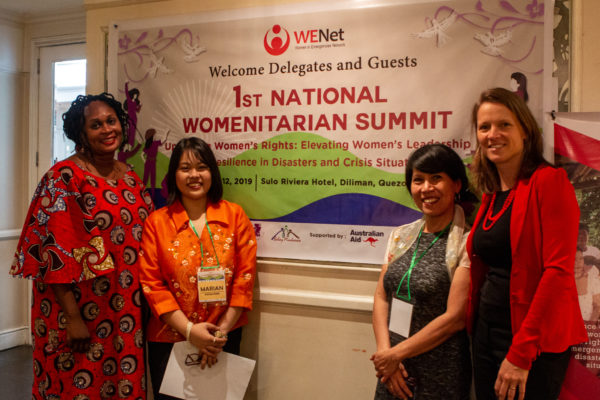
Carol Angir, Marian Ticzon, Ampy and Inge Stokkel at Womanitarian Summit
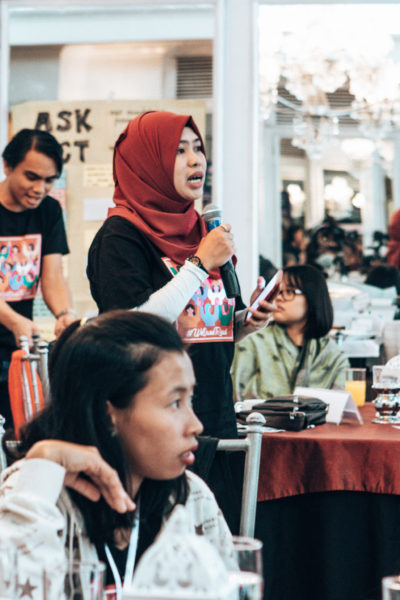
Why are they demanding action?
One key reason for these women coming together is climate change. It is on the rise. We know this, and we’re seeing the impacts. The BBC reported that experts announced in October 2018 that humanity has 12 years to stop temperatures increasing by more than 1.5°C or face potentially catastrophic consequences. Countries such as the Philippines are experiencing the impacts of natural disasters, such as an increase in the number of typhoons per year. Urgent action needs to be taken.
“Due to climate change, the farmers are struggling – our crops and plants are damaged. Our products are low in production,” says Natividad Rosales, President of Villa Enaje Farmers and Fisherfolks Women’s Association in Biliran in April 2019.
We also know that women in low-income countries are the most impacted by climate change. During emergencies, women face a greater struggle for survival. Pre-existing gender inequalities are exacerbated.
In 2013, Typhoon Yolanda was one of the most destructive storms to hit the Philippines. During this disaster, and others like it, women faced an increased risk of violence.
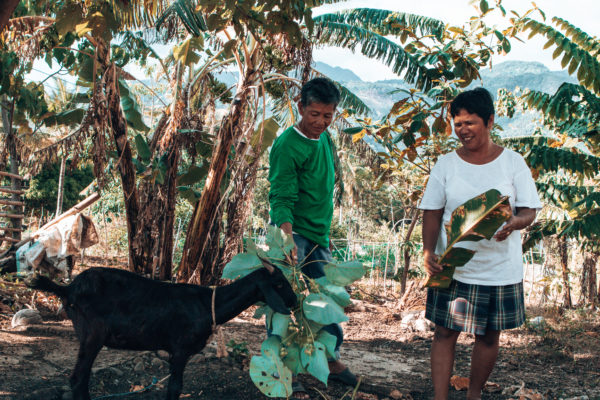
Natividad Rosale, VEFFWA
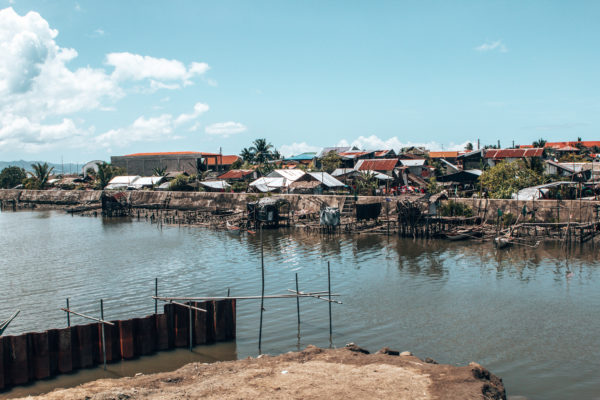
Area heavily impacted by storm surges, Basey, Samar
“Everyone is affected by climate change, but women experience the impacts much worse, it is a struggle,” says Lilibeth Padaya, Vice President of the Palaypay Women’s Association in Basey, Samar.
“Before, we all knew that violence against women was an issue, especially at home. Most of the time, women do not speak up. Even if they are abused or reach the point of being killed, they don’t speak up.”
Another reason why they are demanding action is that women are rarely given the opportunity to lead in humanitarian response. Yet they are exceptional leaders who possess innate leadership skills. Every day, they are supporting their families and their communities. Around the world, they are already intrinsically using their knowledge to create community resilience in the face of a changing climate.
“[Women] have … a nurturing capacity through caring for families, and resilience in the face of challenges. These are essential qualities [for] a leader,” says Marian Ticzon, Project Officer, Women in Emergencies Network during the Womenitarian Summit in April 2019.
When women are empowered to lead, emergencies can be catalysts for positive social change. Women are not only effective and galvanising leaders, ensuring everyone in their community is protected, they also create new opportunities for other women to lead.
In response to Typhoon Yolanda in 2013, ActionAid partnered with the National Rural Women’s Coalition (PKKK). The Women’s Emergency Network (WENet) emerged through this partnership, to drive women’s leadership in disaster planning and response.
“Through these programs, Australia hopes to continue contributing to enhancing gender equality and empowerment of women and girls,” says Inge Stokkel, Australian Ambassador to the Philippines during her summit address.
There are now over 300 women’s groups around the Philippines who have mobilised in their communities and provinces. They are galvanising a women-led response. And it is localised, women-led responses such as these that are imperative in creating change.
“I aspire for more for women here in our community… If there’s an upcoming typhoon here in our community, our women’s association is the first one to patrol around the community. The women are the ones informing the community that there’s a typhoon,” says Lilibeth Padaya.
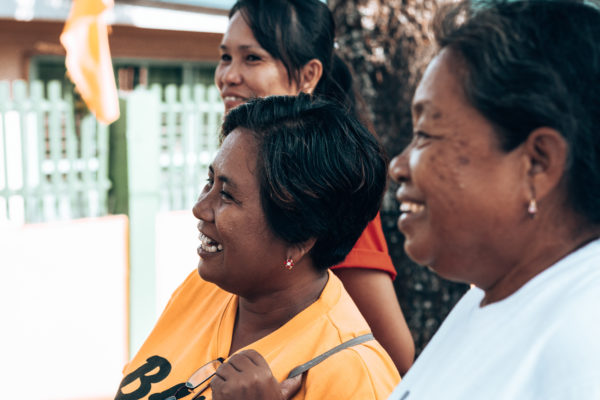
Lilibeth Padaya, member of the Gender Based Violence Watch Group in Basey, Samar
What does the future look like for women in the Philippines?
Since Typhoon Yolanda in 2013, a movement of women mobilising their communities has been emerging. Women are realising that they are not alone in their experiences, and they are coming together to ensure that their voices are heard in places where decisions are being made that affect their lives. As Greta Thunberg stated in the open letter published by the Guardian: “We need to escalate the pressure to make sure that change happens, and we must escalate together.”
This Womenitarian Summit marks an important milestone in the journey for gender equality: raising women’s voices, and supporting women’s rights as leaders. Women’s voices should be placed at the centre of their local community, and the local community should be placed at the centre of decision making.
“We will continue building local women champions. What we want – and need – is more women leaders in this space and we’ll build that through training, funding opportunities and advocating with our supporters to achieve this,” says Marian Ticzon.
To continue reading about inspiring women like Marian, Natividad and Lilibeth, stay tuned in the coming months – ActionAid will be bringing you more stories of women in the Philippines who are standing up and creating change.